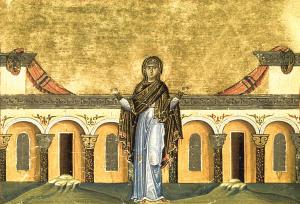
Historically, one of the reasons why women entered religious orders was because they believed that the religious life would give them more control over their own lives than they would have if they remained in secular society. Sadly, over time, many women given over to religious orders in order to restrict them, to keep them in solitude away from society so that their voices could not and would not be heard. What could and should have served a good purpose, to help women overcome the abuses society heaped upon them, became perverted and itself abused, turning it inside-out. This does not mean this was always the case; many women still found their dignity affirmed and restored through their entrance into the religious life, and indeed, used it as a way to promote the dignity of all women. Thus, when we read St. Syncletica talking about the good to be had by those who embraced religious life, we can hear her giving a sharp criticism of the way society treated women:
Let us women not be misled by the thought that those in the world are without cares. For perhaps in comparison they struggle more than we do. For towards women generally there is great hostility in the world. They bear children with difficulty and risk, and they suffer patiently through nursing. And they share illnesses with their sick children – and these things they endure without having any limit to their travail. For either the children they bear are maimed in body, or, brought up in perversity, they treacherously murder their parents. Since we women know these facts, therefore, let us not be deluded by the Enemy that their life is easy and carefree. For in giving birth women die in labour; and yet, in failing to give birth, they waste away under reproaches that they are barren and unfruitful. [1]
Syncletica’s reasoning was quite common, not only in her era, but for many ages to come; women religious saw their ascetic practice as a way to liberate themselves, not only from sin, but from the abuse women experienced by society. Women saw it as a way to take control of their own lives, not to have to suffer the common fate of women in secular society, where they were expected to have many children (risking their lives each and every pregnancy) or else be maligned for their childlessness. It is sadly an attitude we can find among us today as many women feel pressured to have children, being told that there is something wrong with them, such as they are being selfish, if they do not want to have any. However, as Syncletica shows us, this mentality should be rejected. Thankfully women today have more opportunities than they did in the past, giving them a greater sense of dignity even if they do not join a religious community. They can and do have personal autonomy and respect in secular society. This is not to say there is not more which could and should be done, as there is; the improvements we have seen are only a beginning.
Interestingly enough, Syncletica’s view of childbirth was one held by many Christians in her day; they did not see the need to promote or encourage procreation. Christians did not feel there was a call for them to “replenish the earth.” Marriage was viewed as a good, but one with many burdens, which is why those who forswore marred life were not told they were selfish, but rather wise for doing so. Single life was seen as a good, even if someone did not join a religious order – indeed, many promoted it as a better way of life, often writing on the horrors of married life so as to encourage it; this became so accepted that some rejected the good inherent in marriage, requiring Christian scholars to write upon and acknowledge the good to be had in marriage so as to make sure that its institution was not abandoned (even if they often found difficult to do so). Thus, it can be said that ancient Christian views of marriage and children were vastly different from ours, and they would be surprised to see the way some think having large families is the great Christian ideal.
Syncletica showed an awareness of the plight of women in her and many other times. She was not the only one. Many Christian women promoted their own dignity, and they stood fast to their decision, even if it brought down the ire of society upon them, indeed, even if it led to their own deaths as they would rather die than to be forced into marriage and lose control over their own destinies. Thus, those who were able to resist society and its expectations stood out against various abusive norms, being a voice not only for themselves, but for all women, including those who did not have the ability to follow after them in their fight against the system. For those who were free could and would be able to speak out against the system and encourage reform in a way those who were not free could do; by improving their own lot, such women could and would be able to work for others. Selfishness only came into play if their only concern was for their own private good, but that also happens for those who choose married life and have large families: indeed, for many, such large families are an indication of selfishness for they have not considered the greater good and the needs which the common good entails (which often means, having a small family, such as in places where overpopulation is a real problem). [2]
Sadly, we do not have as much literature which shows us the historical thoughts, beliefs, and practices of religious women as we have for religious men. And many of the texts which we possess were written or edited by men, which likely meant, something of the wisdom of such holy women was lost in transmission. This makes it much more important for us to study what we do have and engage it for the wisdom contained in it. We will find that many of our thoughts and practices might not only need reform, but that such reform will free us from dangerous ideologies which threaten the world today. We can see this in the way many women were called to religious life; their reasoning was to stand against a broken, dangerous system which undermined their personal value; it is a system which sadly continues to be promoted to this day (especially by Christians). Women were not called to religious life merely to be celibate virgins put on a pedestal, to serve as the exceptions which prove the rule about their place in society, but rather, they were called to the full Christian witness, to confront and speak out against systematic evil. Thankfully, women do not need to join the religious life, or be one of the few born into privilege, to do so today, though if they have the calling for it, the religious life certainly remains a place for them to act in this fashion. This is one of the changes which shows us how things have improved over time, though it was a long, hard fight. The holiness we see in women like Syncletica shows us that this was not just an accident of history, but also a work of the Spirit, where the Spirit has affirmed and promoted women who did this work in order to make sure that society changed. This is why we should give an ear to those women actively involved with such work and listen to what they have to say to us today, for it is likely that the Spirit continues to work with them and have many more things for us to learn through them so that society can become even better in the future.
[1] Pseudo-Athanasius, The Life And Regimen of The Blessed And Holy Syncletica. Trans. Elizabeth Bryson Bongie (Eugene, OR: Wipf and Stock Publishers, 2005), 30.
[2] “Finally, in certain parts of the world problems resulting from population growth are generating concern,” Gaudium et spes. Vatican translation. ¶47. “ Governments undoubtedly have rights and duties, within the limits of their proper competency, regarding the population problem in their respective countries, for instance, in the line of social and family life legislation, or regarding the migration of country-dwellers to the cities, or with respect to information concerning the condition and needs of the country. Since men today are giving thought to this problem and are so greatly disturbed over it, it is desirable in addition that Catholic specialists, especially in the universities, skillfully pursue and develop studies and projects on all these matter”, ibid. 87.
Stay in touch! Like A Little Bit of Nothing on Facebook.
If you liked what you read, please consider sharing it with your friends and family!













